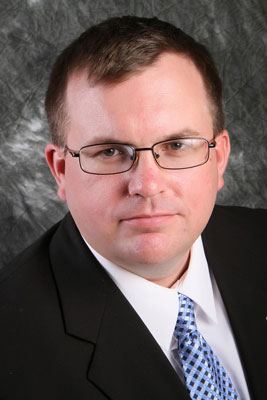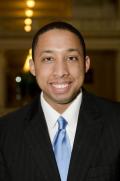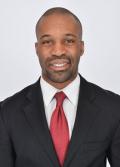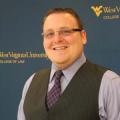
John R. Andrew is a third-year law student at the University of Tulsa College of Law and anticipates a May 2015 graduation. Although he has several areas of interest, John is excited to pursue a career in criminal defense, social security disability law, civil litigation, and family law.
John grew up in a blue-collar environment, and has two sisters and a brother. His parents have been very supportive throughout his life. They are now happily retired.
John received his B.S. in Business Management from the University of Phoenix. He is an Eagle Scout and earned the award in 1991. He was a member of the Boy Scouts of America (BSA) from 1984 until 1994. John currently helps out with conducting birthday celebrations at a local special needs home, which he has done for the last two years. For two years he has acted as a coach of mock trial at Owasso High School (a suburb of Tulsa).
John is currently a member of Delta Theta Phi and the Hudson Hall Wheaton Inns of Court. He has also served as the executive web editor of the Tulsa Law Review, a current delegate and a past Speaker Pro Tem of the Student Bar Association. He has acted as President of the Democratic Law Society, Founder and Past President of American Constitution Society (currently serving as Treasurer), Member of ACLU-TU, Paw Law-Student Animal Legal Defense Fund, Board of Advocates, Sports Entertainment Law, NALSA (Native American Law Student Assoc.), BLSA (Black Law Student Assoc.), and SODA (Sexual Orientation Diversity Alliance).
He took 4th place in the 1L Negotiation Competition (BOA), participated in a trial practice program, and served as scrimmage team member of the TU AAJ Mock Trial team in the spring of 2014. He is currently preparing for this spring's NALSA (Native American Law Student Assoc.) competition at the University of Arizona in Tucson. John worked in the Tulsa County Public Defender's Office in the summer of 2014, where he conducted extensive interviews on indigent clients in the Tulsa County jail. He assisted in the representation of clients on the misdemeanor docket where he assisted in the negotiation of plea agreements for clients.
John has also worked for a Tulsa County District Judge (Judge Daman Cantrell) in the summer and fall of 2013. He assisted with proposed orders and rulings and conducting research as necessary to help inform judicial decisions on the civil docket. He primarily wrote memorandums and proposed orders to assist Judge Cantrell.
Additionally, John has helped to found the local student chapter of the American Constitution Society, championing equality and progressive causes focused on Constitutional interpretation. He is proud of his participation and assistance in a local case where a criminal defendant who was wrongfully convicted was released after twenty years of being incarcerated. John says, "Participating in this case was very rewarding, even though my participation was just assisting when necessary. I worked with other classmates going through the trial transcripts and evidence. The wrongful conviction was related to issues in interpreting the DNA evidence to the jury. We were able to successfully argue that the defendant was wrongfully convicted. The DA's office exonerated the defendant and ultimately there was not enough evidence for a new trial."
Before John began his legal career he was an intelligence analyst. During this time he served a tour in Afghanistan, where he worked to help locate and take down multiple mid-level warlords and financiers who were part of local terrorist organizations. In the 1990's, he helped to open an intelligence facility at Ft. Gordon, GA. This facility was once a former school house on the post and is now a massive operation.
When asked about his hobbies and personal interests, he said, "I play the violin and fiddle, play war games and card games, and read about various legal issues and trials."
John's Academic Law Career and Future Aspirations
Why did John go into law? "I was no longer able to serve in the military after being medically discharged and retired. Because of this, I was afforded the opportunity to go to law school on vocational rehabilitation through the Veteran's Administration. I would never have been able to attend law school if I wasn't able to take advantage of this program. My analysis background translates well into law. I wanted to be able to help people traverse the complicated language of the law. It was ultimately the best way to use my abilities to continue to serve people of the community."
Since life can be hectic at times, he pointed out how he faces obstacles. "I was medically retired after I came down with an ailment during my deployment. The ailment caused pain in my back and legs. It was diagnosed as an autoimmune disorder after a year of medical testing. The illness causes extreme mobility issues and constant pain. I get through the pain by staying busy and keeping up on proper treatment."
John derives his confidence by presenting information to many different levels of command. The information that is being presented has to be correct and precise. The most prestigious General that he presented information to, the head of the Military Intelligence School at Fort Huachuca, AZ, has allowed him to be able to confront attorneys and witnesses with confidence, even if they trump him in experience or charisma.
What are John's key strengths and skills that he leverages to advance his career? "I am very good at interacting with clients and people. My analysis skills have been honed by my previous career."
What are his aims and aspirations? "Ultimately, I hope to open a firm that will specialize in general legal services, focusing on veterans."
What makes John stand out from his peers? "My former military and overseas experience in Afghanistan. I was able to use my analysis skills in stressful situations where lives were on the line. This experience has allowed me to understand that accuracy and efficiency is a high priority even when working in the legal system, where time and organization can be of the essence."
What is John's most influential traveling experience? "I was deployed to Afghanistan. My time in Afghanistan was my most influential because I experienced a third world where many people are living in great poverty. Being able to help those people shake off regional warlords is something that will always stick with me. I hope to continue to help the less fortunate as a lawyer. I also traveled to Australia, where I was able to see a society where social programs are able to help people more extensively by not requiring the indigent to jump through multiple hoops to get assistance and medical care is available to everyone."
Does he have legal role models? John acknowledged:"Abraham Lincoln and Clarence Darrow. Both of these men were able to utilize their legal skills to provide those less fortunate or thrust into a horrible situation with freedoms that were rightfully theirs."
What is John's favorite quote? "The power of the lawyer is in the uncertainty of the law." -Jeremy Bentham
Summary: John R. Andrew is a third-year law student at University of Tulsa College of Law and anticipates a May 2015 graduation.





